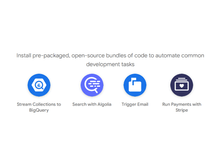Firebase and Supabase are two popular app and web development platforms that are highly popular amongst web developers and application developers. However, both vary in terms of features and other specifications. We'll explore the key similarities and differences between both in this quick comparison. Both services offer a range of features such as real-time databases, authentication, and serverless functions, but they differ in their database technology, pricing models, and specific toolsets. Developers can decide which platform best suits their project requirements and development preferences by understanding the key differences, strengths, and capabilities.
Supabase vs Firebase: An Overview
Firebase is a comprehensive mobile and web application development platform provided by Google. It offers a wide range of features and tools, including real-time database, authentication, cloud functions, hosting, machine learning, analytics, and more. These features help developers build, improve, and grow their apps effectively. Apart from that, it also offers seamless integration with other Google services and APIs. Firebase, hence, enables developers to create high-quality apps with robust backend infrastructure as well as robust functionality.
Supabase, on the other hand, is an open-source Firebase alternative that provides a suite of tools and services for building scalable and secure applications. It makes use of PostgreSQL as its database backend and offers features such as authentication, serverless functions, real-time database, and storage. With its focus on open-source development, Supabase enables developers to create modern applications while also ensuring strong data integrity, scalability, and ease of use. Apart from that, it also offers flexibility and control through self-hosting options.
Firebase vs. Supabase: Key Differences
Here are a few major differences between Firebase and Supabase. These are:
- Firebase uses Realtime Database and Firestore, while Supabase and other Supabase alternatives are built on PostgreSQL.
- Supabase offers real-time capabilities through its PostgreSQL database using WebSocket whereas Firebase provides it through its Realtime Database and Firestore.
- Firebase offers web hosting for static content with SSL support as well as global CDN, while Supabase provides hosting only with a global CDN integrated with its other services.
- Supabase is open source and offers self-hosting with optional paid plans for additional features while Firebase and a few Firebase alternatives operate on a pay-as-you-go model.
- Firebase offers an ML Kit that provides ready-to-use APIs for common use cases in mobile applications, while Supabase doesn’t offer any specific machine learning service.
- Firebase offers flexibility for applications with support for various platforms and languages. While Supabase provides flexibility with its open-source core, allowing for self-hosting.
- Firebase provides Cloud Storage with support for media and user-generated content. Supabase supports this through its integration with object storage providers like Amazon S3 and DigitalOcean Spaces.
Supabase vs Firebase: In Terms of Features
Here are a few differences between Firebase and Supabase based on features like real-time capabilities, data import, machine learning, Crashlytics, analytics, and more.
- Data Import: Supabase allows data import directly into its PostgreSQL database using standard SQL import methods or through its API endpoints. However, Firebase provides tools and APIs for importing data into its Realtime Database and Firestore.
- Real-Time Capabilities: This feature is supported by Firebase through its Realtime Database and Firestore, enabling data synchronization. On the other hand, Supabase supports this through its PostgreSQL database using WebSockets.
- Custom Functions: Firebase allows custom server-side logic to be built and executed in response to Firebase events, HTTPS requests, and more. Supabase supports custom server-side logic through its integration with serverless functions.
- Crashlytics: Firebase Crashlytics helps track, prioritize, and fix stability issues within the app. Supabase, on the other hand, doesn’t have this tool but developers integrate third-party crash tools for similar functionality.
- Machine Learning: Firebase offers an ML Kit to offer ready-to-use APIs for common use cases, like text recognition, face detection, image labeling, etc. Supabase doesn’t offer machine learning services. However, developers integrate ML models and AI services with the data stored in Supabase using custom code or third-party APIs.
- Analytics: Firebase offers comprehensive analytics tools for tracking app usage, user engagement, and conversion metrics. Supabase, in contrast, provides integration support for analytics platforms through custom event tracking and dashboard integrations.
Firebase vs. Supabase: Database Technology
Firebase uses Realtime Database and Firestore, both NoSQL cloud databases for more complex querying and flexible data modeling. Supabase, on the other hand, uses PostgreSQL for stability, reliability, and support for complex queries and transactions.
Supabase vs Firebase: Pricing
Firebase offers a free tier with limited usage and operates on a pay-as-you-go model for increased usage, with different pricing tiers based on usage and additional features. However, Supabase is open source that allows self-hosting for free. Apart from that, it also offers paid plans for managed hosting and additional features such as authentication, storage, and real-time subscriptions.
Firebase and Supabase: Data Migration
Firebase offers tools and documentation for data migration from other databases to Firebase Realtime Database and Firestore. On the other hand, Supabase allows for easy data migration into its PostgreSQL database using standard SQL import methods.
Supabase vs Firebase: Remote Configuration
Firebase offers a remote configuration to change the appearance and behavior of your app without publishing an app update. On the contrary, Supabase doesn’t have a remote configuration feature. However, developers use its APIs and functions to implement custom remote configuration.
Firebase or Supabase: Learning Curve
Firebase is known for its ease of use and well-documented APIs, making it relatively easy for developers to learn and implement. Supabase, built on PostgreSQL has a steeper learning curve for developers less familiar with relational databases, but its well-documented APIs and support resources help ease the learning process.
Supabase vs Firebase: Community Support
Firebase has a large and active community with extensive documentation, tutorials, and community forums for support and learning. Supabase, on the other hand, has a growing community with active support on forums, GitHub, and documentation.
Firebase and Supabase: Scalability & Security
Firebase offers scalable infrastructure and built-in security features, including data encryption, automated backups, and robust access control. In contrast, Supabase uses PostgreSQL's scalability and security features, providing role-based access control, encryption at rest, and secure default configurations.
Supabase vs Firebase: Extensions
Firebase offers a range of extensions for additional features like image resizing, text translation, etc. to enhance app development. Supabase provides extensions for serverless functions, scheduled jobs, and OAuth integrations.
Firebase or Supabase: Performance
Firebase is known for its high performance, with a global network of servers and caching mechanisms for optimized data delivery. Supabase, on the other hand, uses PostgreSQL's performance capabilities, providing high-speed data retrieval and transaction processing.
Supabase vs Firebase: Authentication
Firebase offers robust authentication services, supporting various authentication methods including email/password, phone, Google, Facebook, and more. Supabase, on the other hand, provides authentication services with support for multiple authentication methods and OAuth providers.
Verdict: Supabase vs Firebase
In summary, Firebase and Supabase differ significantly in their database technology, pricing models, hosting services, real-time capabilities, and machine-learning offerings. Firebase leverages NoSQL databases, operates on a pay-as-you-go model with global web hosting, and provides ready-to-use machine learning APIs. On the other hand, Supabase is built on PostgreSQL, offers an open-source service with optional managed hosting plans, provides integrated hosting services with real-time capabilities through WebSockets, and requires custom integration for machine learning functionality.


 4 Ratings & 0 Reviews
4 Ratings & 0 Reviews


















